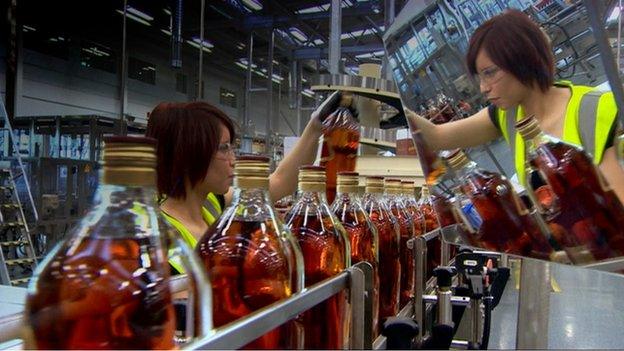How would a Scotch whisky bottle tax work?
- Published

Mr Kay said the production of each bottle of whisky could be taxed
How would a Scotch whisky bottle tax work and what could it raise?
The idea, put forward by two senior economic advisers to the Scottish government, has been examined for BBC Scotland.
Graeme Blackett of Biggar Economics, a consultancy based in Midlothian, examined industry figures, most of which were based on data for 2008, with estimates published since then on how it grew to 2011.
During that time, production rose by 14%, and reached an estimated 1.3 billion standard-size bottles.
The Biggar Economics analysis points to industry turnover in 2011 of £5.048bn - a 28% increase on 2008.
Operating costs are thought to have risen to £1.5bn, with 81% of supplies sourced in Scotland.
Employee costs were put at £526m.
Lower profits or higher prices
The idea of a bottle tax would apply to every bottle that leaves a whisky bond, whether for the UK or export markets. It would be the same for every bottle, whatever its value.
It could be absorbed from the profits of distilling companies. But if it did so, they would make less profit, so they would pay less in corporation tax.
Alternatively, it could be passed on to consumers in higher prices. That could be expected to reduce demand, which is difficult to assess.
But looking at the impact of past tax increases, the Biggar Economics analysis has estimated a fall of 0.43% for every 1% increase in price.
If demand fell, there would be lower profits, so corporation tax on those profits would fall, but by much less than straightforward absorption of profits. There would also be lower tax revenue from excise duty and VAT.
Competitive vodka
Graeme Blackett's analysis suggests the following impact if a bottle tax were absorbed by profits:
A 10p per bottle tax would raise £135m and reduce corporation tax revenue by £31m - with a total revenue of £104m.
A 50p per bottle tax would reduce corporation tax by £155m - with total revenue of £520m
A £1 per bottle tax would cut corporation tax by £310m - leading to a total tax take of £1.039bn.
However, if all the cost of the tax were handed over to consumers, the analysis suggests:
A 10p rise per bottle would cut demand by about 6m bottles, it is estimated. Counting less corporation tax, excise duty and VAT would leave £128m in revenue.
A 50p rise for consumers, would cut demand by 31m bottles, and the tax take could be £626m.
A £1 tax would reduce demand by 61m bottles, resulting in tax revenue of £1.222bn.
The big uncertainty around these figures is how much demand for whisky is driven by price, and what happens to the price of alternative drinks. People could choose to drink less, or switch to vodka or beer.
It could be expected that there would be a varied impact in different export markets.
And of course, distillers could choose to mix the impact of such a tax - absorbing some in profits, and passing some on to consumers.
It is also worth noting that loss of corporation tax, excise duty and VAT reductions would be suffered by the UK Treasury, while the bottle tax would be raised by Holyrood, making such a plan more attractive to MSPs.
- Published9 January 2013
- Published9 January 2013